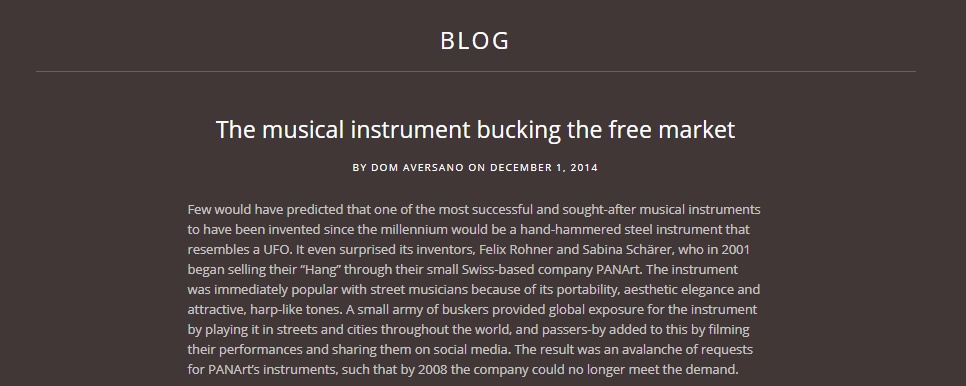Few would have predicted that one of the most successful and sought-after musical instruments to have been invented since the millennium would be a hand-hammered steel instrument that resembles a UFO. It even surprised its inventors, Felix Rohner and Sabina Schärer, who in 2001 began selling their “Hang” through their small Swiss-based company PANArt. The instrument was immediately popular with street musicians because of its portability, aesthetic elegance and attractive, harp-like tones. A small army of buskers provided global exposure for the instrument by playing it in streets and cities throughout the world, and passers-by added to this by filming their performances and sharing them on social media. The result was an avalanche of requests for PANArt’s instruments, such that by 2008 the company could no longer meet the demand.
PANArt’s response to this unusual situation was as interesting as the instrument they invented; the duo continued to hand-make the Hang without hiring extra workers and declined to exploit the favourable supply and demand relationship, choosing instead to keep their prices significantly lower than the Hang’s rapidly inflating market value. PANArt state: “By keeping the price in the range of other comparable instruments and not heeding the market price, Hanghang [the plural of Hang] have found their way into different hands: poor and rich, large and small, healthy and ill.” They write that they are not “capitalistic” and have no intention “to grow and maximise profits”.
These ideals have left the company vulnerable to exploitation, as a person can buy an instrument at a low price for the sole purpose of selling it for a quick profit. Within the Hang community this action is referred to pejoratively as “flipping”, but a quick look at the profit margin reveals why people do it; in 2012 PANArt sold the Hang for 2,400 Swiss francs (roughly $2,600), but at the same time the Hang was selling on eBay for an average of $5,000-7,000.
While some argue that it is a person’s right to sell their instrument for whatever price they wish, it is important to note that everybody who purchases a PANArt Hang signs an agreement stating they will not resell their instrument for more than the price they bought it for. The most common argument made against flipping is that it violates the will of the maker, since it is only possible because of the maker’s original decision to sell the instrument for lower than its market value.
The issue of flipping is further complicated since there are now an estimated 80 companies throughout the world making what have come to be known generically as “handpans”. Yet only a handful of these companies are significantly affected by flipping, as lower quality handpans do not sell for such inflated prices. Of the makers that create handpans of a remotely comparable quality to PANArt’s, all have — to some degree at least — followed PANArt’s model of selling their instruments for less than their market value. However, most makers compromise in some fashion; some sell small batches of instruments on eBay and one company, Pantheon Steel, has developed an intricate lottery system, which though more egalitarian than the open market, is weighted in favour of wealthier clients.
The severest form of regulation that makers use is to blacklist the seller, as well as the instrument sold. A blacklisted person can no longer buy instruments, and the handpan ceases to be eligible for the specialist tuning it periodically requires. This is possible because handpans come with unique serial numbers attached to them, so the instruments and their ownership can be tracked. In addition to this is a more informal but extensive method of regulation carried out by the general handpan community, who network and communicate through global meet-ups and a web forum. They monitor eBay, alert makers to suspicious sales and attempt to persuade people not to flip. Their arguments are moral rather than legal, but can be surprisingly effective. The following story — of which many other similar accounts exist — demonstrates how a person can be persuaded to act in a way that contradicts so-called normal market behaviour.
A man named Jack discovered that his friend owned a valuable PANArt Hang. The friend was unaware of its value and sold the instrument to Jack for just €1,000 to aid him in raising money for a winery business. Jack loved the instrument, but felt he had deceived his friend by not disclosing its true value when he bought it. He consulted the handpan community through their web forum and shared his dilemma. The general consensus was that he should tell his friend the true value of the instrument and offer to return it.
He followed the community’s advice and told his friend, who was surprised by the instrument’s value, but said that the sale had been made and it was now his property. Jack explained to him the selling ethics of the handpan community, but his friend was clear that were the instrument sold back to him he would sell it for the highest price possible. Despite Jack knowing the instrument would be flipped, he chose to sell it back to his friend for €1,000, who then sold it on eBay for €9,000.
Stories like these demonstrate the powerful influence the community has over sales, but the act of flipping, which is so strongly opposed, had its definition challenged this year, when one of the world’s most prominent handpan players, Daniel Waples, split opinion by giving his PANArt Hang away in a lottery.
Waples offered anyone who bought his £12 album the opportunity to win his instrument, by writing their names on a piece of paper and placing them inside his Hang, and then having a person pull out the winning name at random. It followed on from a lottery months prior by a player called Sergio, who tried to make €5,000 by selling 200 tickets for €25. The small but important difference in the lotteries was that in Sergio’s all but one person walked away empty-handed, but in Waples’ everyone got an album. Some viewed Waples’ lottery as a fair method for passing on his instrument to a fan, others as a disguised method of flipping.
Waples responded to these criticisms, saying “I wanted to offer my pan to someone who supports me” and that “essentially I wasn’t raffling an instrument, I was selling an album, and everyone who buys that album gets entered into a draw”. He described his motivation for this being “to show support to the new and aspiring builders that are out there”. Waples declined to state precisely how much he made in album sales, but was clear that it was more than the price the instrument was bought for; far from being deterred by the controversy, he said he was “contemplating the idea of making it an ongoing thing”.
The entire argument against flipping relies upon the belief that the rules of the handpan community are superior to the law and that the instruments are underpriced for reasons of altruism. However, it can equally be argued that power plays a part too. With the current arrangement players are beholden to companies to whom they must openly declare their sales or risk penalisation; serial codes on instruments make the sales of individuals more transparent, but no company that I am aware of has reciprocated this by publishing their sales data and matching it to their serial codes and there is also the inconsistency that certain handpan makers sell batches of instruments on eBay, but cry foul when individuals do the same.
It would be naïve to deny that the spirit of the gold rush exists within the handpan movement, but it is also overly cynical to see things only in this light and ignore the fact that much of the behaviour is genuinely non-materialistic and anti-profit. Cultural habits exist that are difficult to explain in any way other than altruistic, such as in sales where one person does not own a handpan (termed “panless”), but the other does, the former will be favoured, since needs enter into transactions.
Despite the inevitable imperfections of the handpan community, it appears to be a genuine counter-cultural movement that demonstrably undermines the rigid core beliefs of free-market philosophy. The decision of PANArt and others to keep their prices low has prevented the instrument from becoming a luxury item exclusively for the wealthy and allowed the burgeoning of an alternative musical community around a fascinating new instrument.
Photo by Lucia Molina
Note: This article was originally published the December 2014 Issue of Contributoria. It is republished here under a Creative Commons licence. If you wish to republish it, please attribute the original article.

